QuestionQUESTION: I have a wonderful 5 year old neutered male yellow lab (Bailey). In March, I adopted a 10 week old abandoned female black lab (Abby). She was found with her mother and 3 other sisters so she spent the first 10 weeks of her life with her siblings and mother. She is now 7 months old. She is very playful and constantly tries to engage Bailey in play. Sometimes Bailey is ready, other times he is not. She bites his ears and also tries to bite his back legs to get his attention. Bailey does play well with her much of the time. However, inevitably, Bailey becomes tired of her and angered by her constant play. At that point in time, he becomes aggressive and growls, and goes for her neck. The entire time I've had Bailey, he has had many different "doggy play groups" that he participates in. He has never had any socialization problems. He continues appropriate play behavior when I take the two of them to our puppy play groups - but he WILL become aggressive toward Abby within the play group environment. I don't know who to correct or how to do it. Abby is obviously annoying the heck out of him but he eventually loses his cool and responds inappropriately.
I need to know who to correct and specific steps on HOW to correct their behavior. Thanks for any help you can give.
ANSWER: Bailey is behaving appropriately, although I UNDERSTAND that this alarms you. How does Abby respond when Bailey aggresses toward her? Has he ever really injured her (aside from her "feelings")? My guess is, Abby stops her behavior and leaves (perhaps tail tucked under), but she has never actually been injured (broken skin, bleeding, vet visit.) If this proves true, you have to allow these two their interactions without intervening. As for his behavior toward Abby in play groups with other dogs, this is a normal carry over and I would actually expect this response. His aggression, as you perceive it and report it (with no report of actual injury) is, in that context, not aggression at all but normal rank display of adult toward adolescent. How does Abby respond in group situations when Bailey curtails her enthusiasm? How do the OTHER dogs respond to both Bailey and Abby AFTER this occurs? These are answers I'd like to read, but so far you're not giving me any reason for concern.
---------- FOLLOW-UP ----------
QUESTION: Thanks for your quick response.
Neither dog has injured the other. Abby never really backs off once she is in play mode. Sometimes Bailey can get her down on the ground and go for her throat, Bailey's growl and behavior seems vicious. Abby will jump back up and go after Bailey again. I have never seen Abby tuck her tail for any reason nor does she ever just walk away. Within the play groups when this interaction starts, the other dogs remove themselves from the two of them. The last two times we were in play group and this happened, I put Bailey on his leash and gave him a 5 minute "time out." Abby just continued playing with the other dogs.
AnswerWhat you did in play group was a big problem. You're disciplining a dog that is doing his self perceived job and, even worse, you're giving Abby the signal that Bailey doesn't count and is low ranking. Don't do that again. Instead, in group play situations put Abby on a long extended lead or a very short (single handle) lead you can easily grasp. If Bailey interferes with her, walk directly to him, make eye contact, and verbally correct him with a low, growling "Nah". (Do this ONLY in play group, NOT at home; at home, leave him be.) Then use the leash to remove Abby and keep her out of the mix for at least three minutes. This won't assist her hyperactivity but it will make her perceive Bailey as higher ranking, short circuit what appears to be Bailey's increasing struggle and certainly create of you an authority figure.
Bailey is attempting to assert control; unfortunately, Abby has a rather large excitability problem and most likely a low attention threshold. If what Bailey is doing at all affected Abby, she would be correcting her behavior. Bailey, on the other hand, may very well be getting the short end of this stick. You must interrupt this boisterous, over the top play behavior Abby is demonstrating when you see Bailey has had his fill. Step in, as you do in the play group, and remove Abby from Bailey for a few minutes until she has visibly calmed. Do NOT pet her, talk to her, or show any attention she can misconstrue as reward. Simply hold onto her leash and ignore her, then release her when she is calmer (this might be a while the first few times but should shorten.) You do not want to in any way punish or embarrass (yes, dogs get embarrassed) Bailey; he's doing his best to control an out of control puppy. But it's not his job: it's your job. You don't want to reward his correction of Abby but you don't want to inhibit it either. He has the right and even the responsibility to exert his seniority.
Meanwhile, begin to use positive reinforcement training with Abby. Teach her one strong behavior she can offer successfully 100% of the time. This might take some time with her, so be patient (as I know you will.) Once she has obtained this behavior, during her "time out" from Bailey (at home), when she is visibly calmer (ten to thirty seconds after removal), ask her for the behavior you can reward. Then return her to free interaction with Bailey. Teaching this behavior in very VERY short intervals over the course of each day for 2 to 3 weeks should do the trick; don't use it until she's really got it. Then proceed and report back with results.

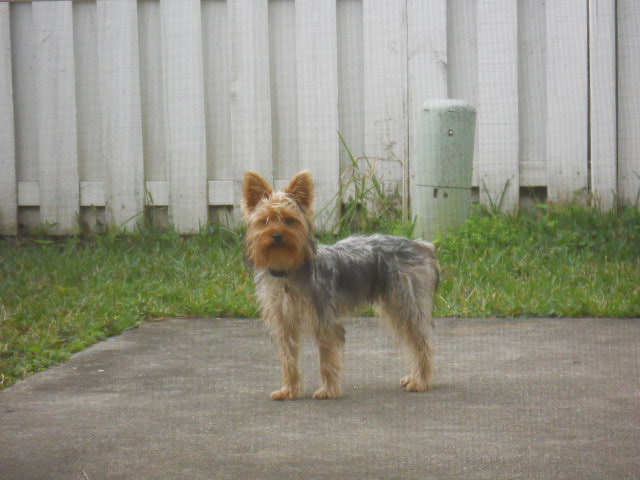 agressive silky terrier
Question
Lucas 1 year old
Hi Jennifer:
I have a
agressive silky terrier
Question
Lucas 1 year old
Hi Jennifer:
I have a
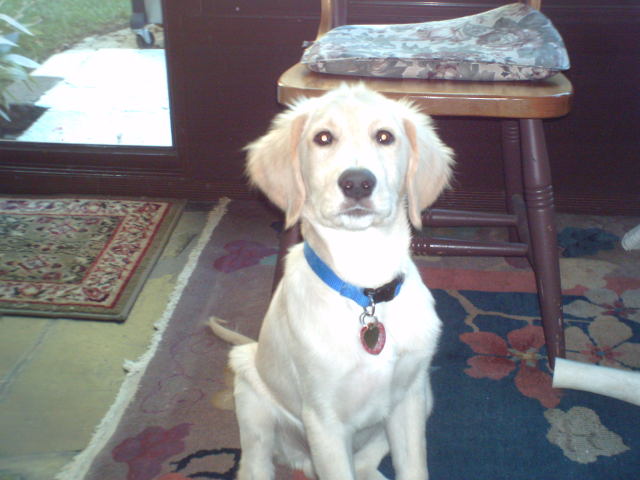 my 7 month old golden changed for the worse
QuestionRiley at 6 months
QUESTION: I got a gold
my 7 month old golden changed for the worse
QuestionRiley at 6 months
QUESTION: I got a gold
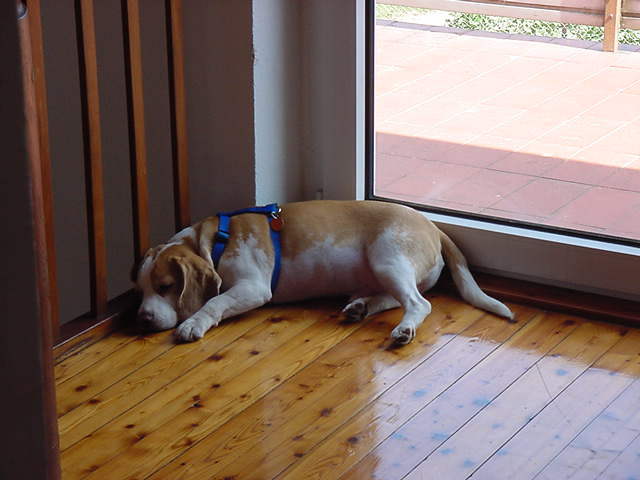 licking the floor not stop
QuestionGeorgie
QUESTION: Hi,
I have a 7 year ol
licking the floor not stop
QuestionGeorgie
QUESTION: Hi,
I have a 7 year ol
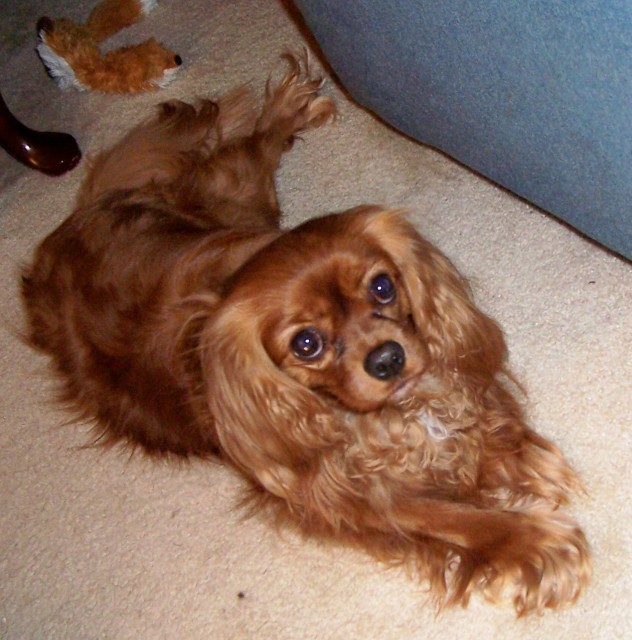 Dog light and shadow chasing
Question
Jenni
My 3 year old Cavalier King Charles Span
Dog light and shadow chasing
Question
Jenni
My 3 year old Cavalier King Charles Span
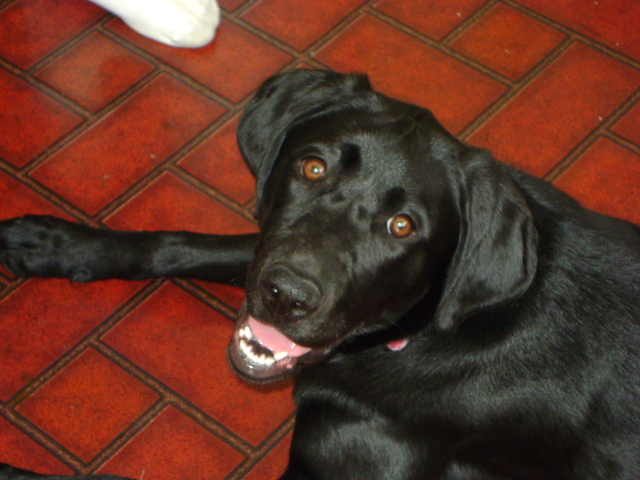 Black lab - 1 yr
QuestionSheba
QUESTION: My lab loves to bite her
Black lab - 1 yr
QuestionSheba
QUESTION: My lab loves to bite her